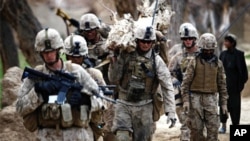Obviously, a government shutdown would affect the daily lives of those who work for the federal government, but the impact goes well beyond the federal workforce.
It is not just federal employees in the capital who will feel the effect of a government shutdown.
Secretary of Defense Robert Gates told soldiers in Iraq Thursday that they will continue to get paid. "You know, as a historian, it always occurred to me that a smart thing for government was always to pay the guys with guns first," he said.
But, Gates explained, they would not collect paychecks during the shutdown for hours worked during the shutdown. Like all federal employees who are deemed essential and required to work, they would be back paid after a budget is reached. A delay in pay could translate to troubles for families struggling to pay rent and bills.
"So that's, that's the deal, and I'm, you know, frankly, I remember when I was your age, I did a lot of living from paycheck to paycheck, and so I hope this thing doesn't happen because I know it will be an inconvenience for a lot of troops," Gates said.
Potential fallout from a shutdown ranges from serious personal financial struggles to annoyances during long-awaited vacations. Tourists who hoped to visit the Smithsonian's 19 museums and zoo would not have the chance.
Linda St. Thomas, a spokeswoman for the Smithsonian Institution, said an April weekend could draw as many as 500,000 visitors to Smithsonian spots - spots that could be closed Monday.
"Well, the museums and the zoo will have to close if there is a government shutdown because most of our employees are federal, and federal employees are not permitted to work during a shutdown," she said.
That's not to say the priceless collections of paintings will be unguarded. Some federal employees would be exempted from a shutdown, such as security personnel at the museums. Even though visitors would not be able to see the lion cubs at the National Zoo, vets and zookeepers would continue their work caring for the animals.
The government has shut down before, most memorably for 22 days in 1995-1996 during the Clinton administration. St. Thomas said this time it is different because the timing is different. "It was the dead of winter. It was December and early January. This is completely different. This is tourist season," she said.
For people who want to enjoy the tourist life in the U.S., as well as people in the U.S. with hopes of traveling overseas, there could be inconveniences.
State Department Acting Deputy Spokesman Mark Toner said Wednesday that passport, consular and visa services would likely be affected if the government shuts down Monday.
"There would be an impact, obviously, if only because of the effect of reduced personnel, but it's hard for me to say right now whether that would be a significant slowdown or beyond that."
Toner suggested that people who have appointments at embassies should call ahead or consult embassy websites. He added that the State Department would continue to provide emergency consular services to U.S. citizens in need.
Some U.S. citizens at home are in need of a break. President Barack Obama Wednesday spoke of a man named J.T. Henderson who recently appeared on a nightly news program.
"He said he's counting on his tax rebate because his family has been scraping by, and he might not get it if the government shuts down. So J.T. said if he could speak directly to all of us in Washington he'd tell us that all of this political grandstanding has effects as it trickles down to normal, everyday Americans," he said.
Some financial analysts say the economy, while improving, is still vulnerable to a shake-up from a shutdown.
Economist Gus Faucher, director of macro-economics at Moody's Analytics, said a brief shutdown would have only a minor impact on the economy, even though government employees would not be collecting paychecks.
"They'll probably continue to spend. It won't have much of an impact on consumer confidence. I think that federal contractors will try to avoid layoffs at least if it appears that it is going to be a short shutdown," Faucher said.
But, Faucher said, if the impasse stretches beyond two weeks, federal workers could cut spending and unpaid federal contractors could initiate layoffs. Consumer confidence could fall at a time when the unemployment rate is nearly nine percent.
Faucher said he would be very surprised if the shutdown has much of an effect on international markets.
"You know, I think this is just viewed as one of those idiosyncrasies that the U.S government goes through occasionally, and as long as it appears that Congress is working toward a solution, I wouldn't expect it to have much of an impact there at all," he said.
Lawmakers might have even more impetus to reach a solution, as a delay could get smelly. Trash collection in the capital will be suspended for at least the first week of the shutdown, if one occurs.




